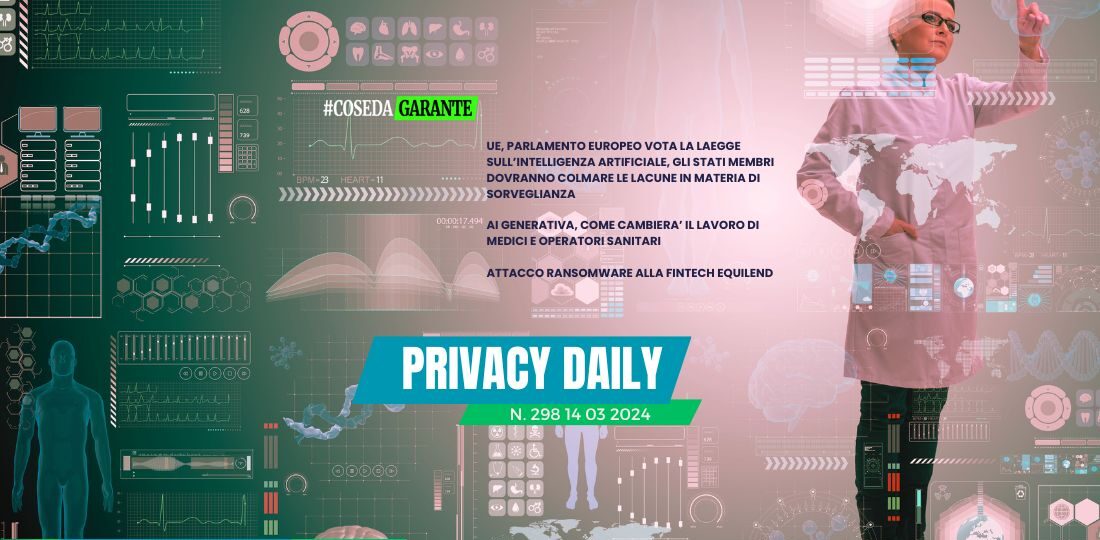VERSIONE ITALIANA
UE, PARLAMENTO EUROPEO VOTA LA LAEGGE SULL’INTELLIGENZA ARTIFICIALE, GLI STATI MEMBRI DOVRANNO COLMARE LE LACUNE IN MATERIA DI SORVEGLIANZA
La legge che è stata dal parlamento europeo vieta gli usi ritenuti come “inaccettabili” dell’intelligenza artificiale e stabilisce requisiti tecnici, di supervisione e di responsabilità per l’IA detta ad alto rischio. La legge non riesce ancora a vietare tutte le pratiche come il riconoscimento facciale automatizzato. Le restrizioni all’uso del riconoscimento facciale in tempo reale e retrospettivo sono purtroppo minime e non si applicano alle aziende private o alle autorità amministrative. Stante la rimozione dall’attuale testo di una precedente restrizione è stato introdotto un vago riferimento alla “minaccia” di un reato che ora può essere sufficiente a giustificare l’uso del riconoscimento facciale retrospettivo negli spazi pubblici. Gli Stati membri hanno però la possibilità di adottare norme più severe a livello nazionale. AlgorithmWatch e altre organizzazioni chiedono al governo tedesco di vietare la sorveglianza biometrica di massa senza eccezioni.
https://algorithmwatch.org/en/eu-parliament-votes-on-ai-act/
AI GENERATIVA, COME CAMBIERA’ IL LAVORO DI MEDICI E OPERATORI SANITARI
Le tecnologie basate sulla intelligenza artificiale stanno avendo un impatto importante su molteplici campi compreso quello della salute. Grazie all’uso di dati l’IA avrà un impatto progressivamente sempre più significativo nella diagnosi e nel trattamento delle malattie, nello sviluppo di nuovi farmaci e nella personalizzazione dei trattamenti per i pazienti. Questo porterà medici ed infermieri a sviluppare ulteriormente il rapporto umano con i pazienti. Tuttavia, ci sono anche sfide pratiche ed etiche che devono essere affrontate. L’IA generativa può essere utilizzata per interpretare i dati e fornire intuizioni chiare e approfondite per una diagnosi accurata, ma è necessario, in questo processo, garantire la privacy dei dati dei pazienti. Nonostante queste sfide, l’IA generativa promette di rivoluzionare il settore sanitario e migliorare la qualità della cura fornita ai pazienti.
https://www.forbes.com/sites/bernardmarr/2024/03/13/how-generative-ai-will-change-the-jobs-of-doctors-and-healthcare-professionals/
ATTACCO RANSOMWARE ALLA FINTECH EQUILEND
La società fintech EquiLend ha informato propri dipendenti di un data breach risalente a gennaio 2024, causato da un attacco ransomware. I servizi sono stati interrotti per alcuni giorni ufficialmente per un “problema tecnico” che successivamente è stato rivelato essere un attacco ransomware. I servizi per i clienti sono stati ripristinati entro il 5 febbraio, ma fino ad ora non sono stati forniti dettagli sull’entità della violazione. EquiLend ha poi informato l’Office of Consumer Affairs and Business Regulation del Massachusetts del data breach e e ha iniziato a notificare, quanto accaduto, ai soggetti potenzialmente interessati. La lettera di notifica ha rivelato che i dati compromessi includono nomi, date di nascita, numeri di previdenza sociale e informazioni sulle buste paga. Non ci sono prove che le informazioni personali siano state utilizzate per frodi, ma l’azienda offre servizi gratuiti di protezione contro il furto d’identità. Al momento non sono stati resi noti il numero esatto di persone colpite.
https://www.securityweek.com/equilend-ransomware-attack-leads-to-data-breach/
VERSIONE INGLESE
EU, EUROPEAN PARLIAMENT VOTES ON ARTIFICIAL INTELLIGENCE LAW, MEMBER STATES TO CLOSE OVERSIGHT LOOPHOLES
The law passed by the European Parliament bans uses deemed “unacceptable” of artificial intelligence and sets technical, supervision and liability requirements for so-called high-risk AI. The law still fails to ban all practices such as automated facial recognition. Restrictions on the use of real-time and retrospective facial recognition are unfortunately minimal and do not apply to private companies or administrative authorities. Due to the removal of a previous restriction from the current text, a vague reference to the ‘threat’ of an offence has been introduced, which may now be sufficient to justify the use of retrospective facial recognition in public spaces. However, Member States have the possibility to adopt stricter rules at national level. AlgorithmWatch and other organisations are calling on the German government to ban mass biometric surveillance without exception.
https://algorithmwatch.org/en/eu-parliament-votes-on-ai-act/
GENERATIVE AI, HOW IT WILL CHANGE THE WORK OF DOCTORS AND HEALTH WORKERS
Technologies based on artificial intelligence are having a major impact on multiple fields including health. Through the use of data, AI will have a progressively more significant impact on the diagnosis and treatment of diseases, the development of new drugs and the personalisation of treatments for patients. This will lead doctors and nurses to further develop the human relationship with patients. However, there are also practical and ethical challenges that need to be addressed. Generative AI can be used to interpret data and provide clear and insightful insights for accurate diagnosis, but it is necessary in this process to ensure the privacy of patient data. Despite these challenges, generative AI promises to revolutionise the healthcare sector and improve the quality of care provided to patients.
https://www.forbes.com/sites/bernardmarr/2024/03/13/how-generative-ai-will-change-the-jobs-of-doctors-and-healthcare-professionals/
RANSOMWARE ATTACK AT FINTECH COMPANY EQUILEND
The fintech company EquiLend informed its employees of a data breach dating back to January 2024, caused by a ransomware attack. Services were interrupted for a few days officially due to a ‘technical problem’ that was later revealed to be a ransomware attack. Services for customers were restored by 5 February, but no details on the extent of the breach have been provided so far. EquiLend then informed the Massachusetts Office of Consumer Affairs and Business Regulation of the data breach and began notifying potentially affected parties of what had happened. The notification letter revealed that the compromised data included names, dates of birth, social security numbers, and payroll information. There is no evidence that personal information was used for fraud, but the company offers free identity theft protection services. The exact number of people affected has not been disclosed at the moment.
https://www.securityweek.com/equilend-ransomware-attack-leads-to-data-breach/



